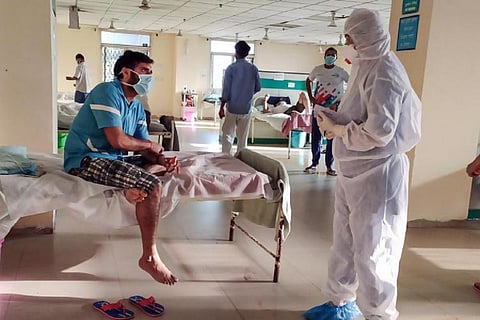

This story is a part of the TNM COVID-19 reporting project. To support this project, make a payment here.
The second wave of COVID-19 infections that ravaged India in April and May 2021 was more infectious than the first wave, with hospitals seeing more symptomatic patients of younger age groups, and increased COVID-19-related complications such as mucormycosis or black fungus. Apart from affecting the respiratory system and immunity of patients, COVID-19 is also an endothelial disease, which means it affects the layer of cells lining the blood vessels in our bodies. This leads to the formation of blood clots, which could result in amputation, heart attacks or even strokes. The clots also contribute to lung damage, as they can affect microcirculation in the lungs.
In the second wave of COVID-19, blood coagulation or the blood clotting system is being affected, says Dr Devananda NS, renowned cardiologist associated with Manipal Hospital in Bengaluru. He explains that with the newer variants of the coronavirus, doctors are seeing an increase in the number of COVID-19 patients with blood clots in the body. Many of these people are between the age of 30-40 years, with no previous history of cardiovascular dysfunction. Dr Devananada says he has seen about 20-30% of COVID-19 patients in Manipal Hospital develop mild to severe heart-related conditions due to clotting. Many of these patients had no history of endothelial dysfunction before.
The clots are typically seen within a week or two after contracting the coronavirus, Dr Devananda says. Those with pre-existing conditions like diabetes, long-time hypertension, obesity etc, where the endothelial linings and heart muscles already face some amount of distress, are at higher risk of developing clots and other heart-related issues due to COVID-19. This is because their blood vessels already contain some blockages, which could further restrict blood flow in case clots are formed.
The formation of these clots is dangerous, as they obstruct blood flow, which could have various effects depending on the part of the body where they appear. They could cause brain strokes or damage parts of the heart itself, due to sudden stoppage of blood supply. “Blood flows everywhere, so any organ could get affected,” Dr Devananda explains.
After identifying where the clots lie, surgical interventions include sucking them out or placing stents; however, this doesn’t remove the underlying condition of the COVID-19 infection, Dr Devananda explains. Since there is no specific drug to cure COVID-19, the doctor explains that maintaining general health helps prevent severe effects of the virus. This includes a healthy diet, exercise and a healthy lifestyle. He points out that most people who react ‘badly’ when they contract the coronavirus are those with pre-existing conditions, as their bodies are already under stress. So, an easy preventive measure is keeping good health and maintaining protocols such as wearing masks and regularly sanitising hands and surfaces. “These things can go a long way right now,” Dr Devananda says.
This story is a part of the TNM COVID-19 reporting project. To support this project, make a payment here.